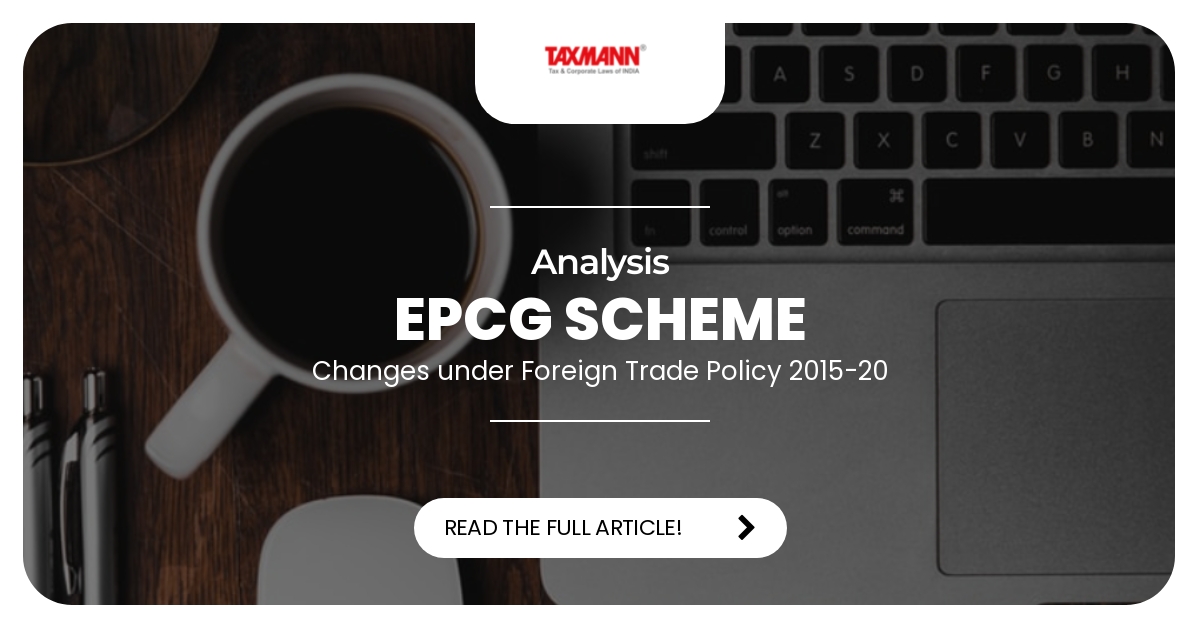[Analysis] Changes in EPCG Scheme under Foreign Trade Policy 2015-20
- Blog|Advisory|GST & Customs|
- 3 Min Read
- By Taxmann
- |
- Last Updated on 26 May, 2022

Taxmann’s Research and Advisory (Indirect Tax) Team
With the intent to reduce the compliance burden and enhance the ease of doing business, the DGFT has made a few amendments relating to the EPCG scheme under Foreign Trade Policy 2015-20. The relevant amendments made in this regard has summarized below for your kind reference:
Table of Contents
- Changes relating to time limit for applying for the extension in fulfilling Export Obligation (EO) of first block
- Extension in time limit for submitting Annual Report relating to fulfilment of export obligation
- Payment of Additional Fees for deviation in import value up to permissible limit
- Changes relating to applying for extension in Export Obligation Period
- No option to use Duty Credit Scrips for paying Customs Duty for regularizing export obligation
1. Changes relating to time limit for applying for the extension in fulfilling Export Obligation (EO) of first block
The time limit for applying for the extension of the EO period for the first block of 50% has been changed. The revised time limits for applying such extension along with the applicability of the composition fee and late have been summarized as under:
|
Where extension is applied |
Composition fee/ Late fee |
| Within 6 months from the expiry of first block | Composition fee of 2% would be payable |
| After the said 6 months but up to 6 years from the authorization date * | Composition Fee + Late fee Rs. 10,000 per year per authorization |
| 6 years onwards but maximum up to 8 years* | Composition Fee + Late fee Rs. 10,000 per year per authorization + Additional late fee Rs. 5,000 per year per authorization |
*Extension of time limit beyond 6 months is subject to consideration by Regional Authority (‘RA’)
2. Extension in time limit for submitting Annual Report relating to fulfilment of export obligation
The time limit for reporting the fulfilment of EO has been extended from April 30 to June 30. Further, late fees of Rs. 5000 per authorization for each financial year would be levied for delay in submission of such report.
3. Payment of Additional Fees for deviation in import value up to permissible limit
The Foreign Trade Policy permits deviation of 10% of the duty saved amount from the amount indicated in the authorization. In this regard, the exporter is required to furnish additional fees to cover excess imports affected in terms of duty saved amount.
The time limit for furnishing such additional fees has been changed. From now onwards the authorization holder is required to furnish the additional fees to cover excess imports affected at the time of application for the Export Obligation Discharge Certificate (‘EODC’). The export obligation would automatically stand enhanced proportionately.
4. Changes relating to applying for extension in Export Obligation Period
The Time limit for applying for an extension increased from 90 days to 6 months. Specific provisions are introduced to allow extension after 6 months from the date of expiry of the original EO period but up to 8 years on payment of late fees as under:
| Time limit |
Composition fee/ Late fee |
| Extension applied within 6 months from the expiry of EO period | Composition Fee of 2% |
| Extension applied after said 6 months but within 8 years from the date authorization | Late fees of Rs. 10,000 |
| After said 8 years * | Additional late fees of Rs. 5,000 for each year per authorization |
* Extension for fulfilling the export obligation beyond 8 years is not permitted. Extension of time limit beyond 6 months is subject to consideration by RA.
5. No option to use Duty Credit Scrips for paying Customs Duty for regularizing export obligation
Provision relating to furnishing duty credit scrips for paying the Customs Duty component in respect of export obligation has been omitted.
Disclaimer: The above comments are for guidance purposes and cannot be construed as a legal advisory. In case of any query in this regard, feel free to reach us at connect@taxmann.com.
Disclaimer: The content/information published on the website is only for general information of the user and shall not be construed as legal advice. While the Taxmann has exercised reasonable efforts to ensure the veracity of information/content published, Taxmann shall be under no liability in any manner whatsoever for incorrect information, if any.

Taxmann Publications has a dedicated in-house Research & Editorial Team. This team consists of a team of Chartered Accountants, Company Secretaries, and Lawyers. This team works under the guidance and supervision of editor-in-chief Mr Rakesh Bhargava.
The Research and Editorial Team is responsible for developing reliable and accurate content for the readers. The team follows the six-sigma approach to achieve the benchmark of zero error in its publications and research platforms. The team ensures that the following publication guidelines are thoroughly followed while developing the content:
- The statutory material is obtained only from the authorized and reliable sources
- All the latest developments in the judicial and legislative fields are covered
- Prepare the analytical write-ups on current, controversial, and important issues to help the readers to understand the concept and its implications
- Every content published by Taxmann is complete, accurate and lucid
- All evidence-based statements are supported with proper reference to Section, Circular No., Notification No. or citations
- The golden rules of grammar, style and consistency are thoroughly followed
- Font and size that’s easy to read and remain consistent across all imprint and digital publications are applied



 CA | CS | CMA
CA | CS | CMA
